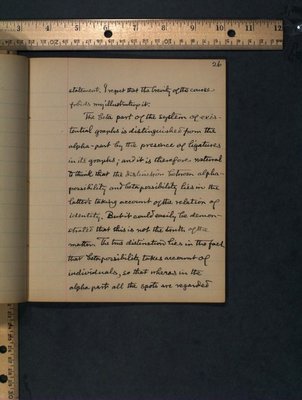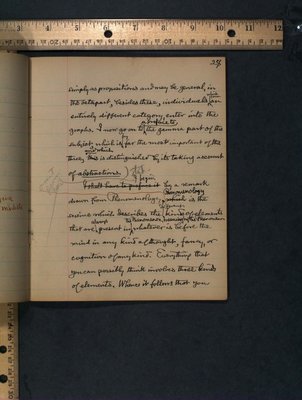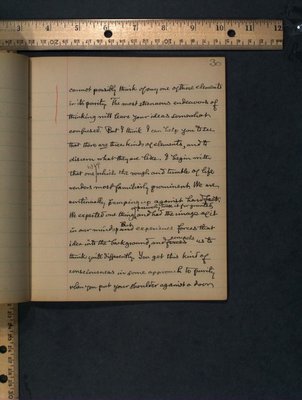Pages
16
26
statement. I regret that the brevity of its course forbids my illustrating it. The beta part of the system of existential graphs is distinguished from the alpha-part by the presence of ligatures in its graphs; and it is therefore natural to think that the distinction between alpha-possibility and beta possibility lies in the latter's taking account of the relation of identity. But it could easily be demonstrated that this is not the truth of the matter. The true distinction lies in the fact that beta possibility takes account of individuals, so that wheras in the alpha part all the spots are regarded
17
28
simply as propositions and may be general, in the betapart, besides these, individuals, which form an entirely different category, enter into the graphs. I now go on to a preface to the gamma part of the subject which is by far the most important of the three, and which is distinguished by its taking account of abstractions.
I shall have to preface it I begin by a remark drawn from Phenemenology. Phenemenology is the science which describes the different kinds of elements that are always present in the phenomenon, meaning by the Phenomena whatever is before the mind in any kind of thought, fancy, or cognition of any kind. Everything that you can possibly think involves three kinds of elements. Whence it follows that you
[Left Margin: Omit from here - in pencil (lines drawn after 'of abstractions'). New paragraph]
18
30
cannot possibly think of any one of those elements in its purity. The most strenuous endeavors of thinking will leave your ideas somewhat confused. But I think I can help you to see that there are three kinds of elements, and to discern what they are like. I begin with that one [illegible???] which the rough and tumble of life renders most familiarly prominent. We are, continually bumping up against hard facts. We expected one thing or passively took it for granted, and had the image of it in our minds. But experience forces that idea into the background, and compels us to think quite differently. You get this kind of consciousness in some approach to purity when you put your shoulder against a door
19
32
and try to force it open. You have a sense of resistance and at the same time a sense of effort. There can be no resistance without effort: there can be no effort without resistance. They are but only two ways of describing the same experience. It is a double consciousness. We become aware of our self by in becoming aware of the not-self. The waking state is a conciousness of reaction; and as the consciousness itself is two-sided, so it has also two varieties; namely, not willing action, where our modification of other things is more prominent than their reaction on us, and perception, where their effect on us is far overwhelmingly greater than our effect on them. And this notion of being such as another thing other things makes us becomes, is such a prominent part of our life, that we conceive




